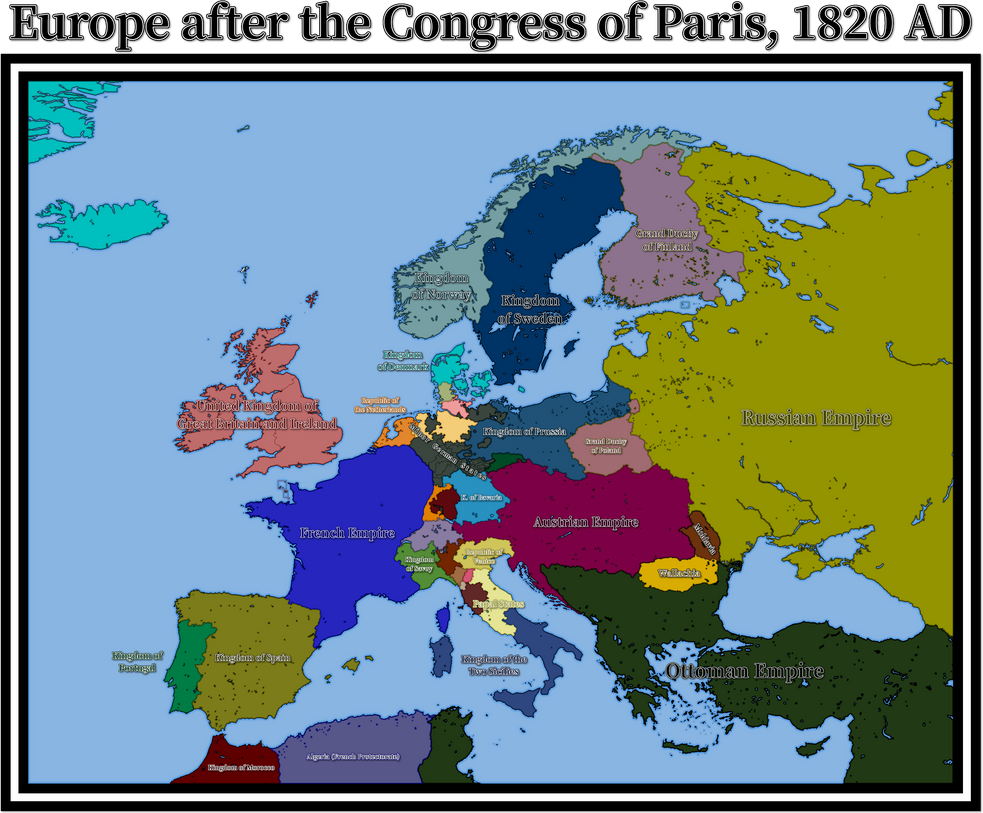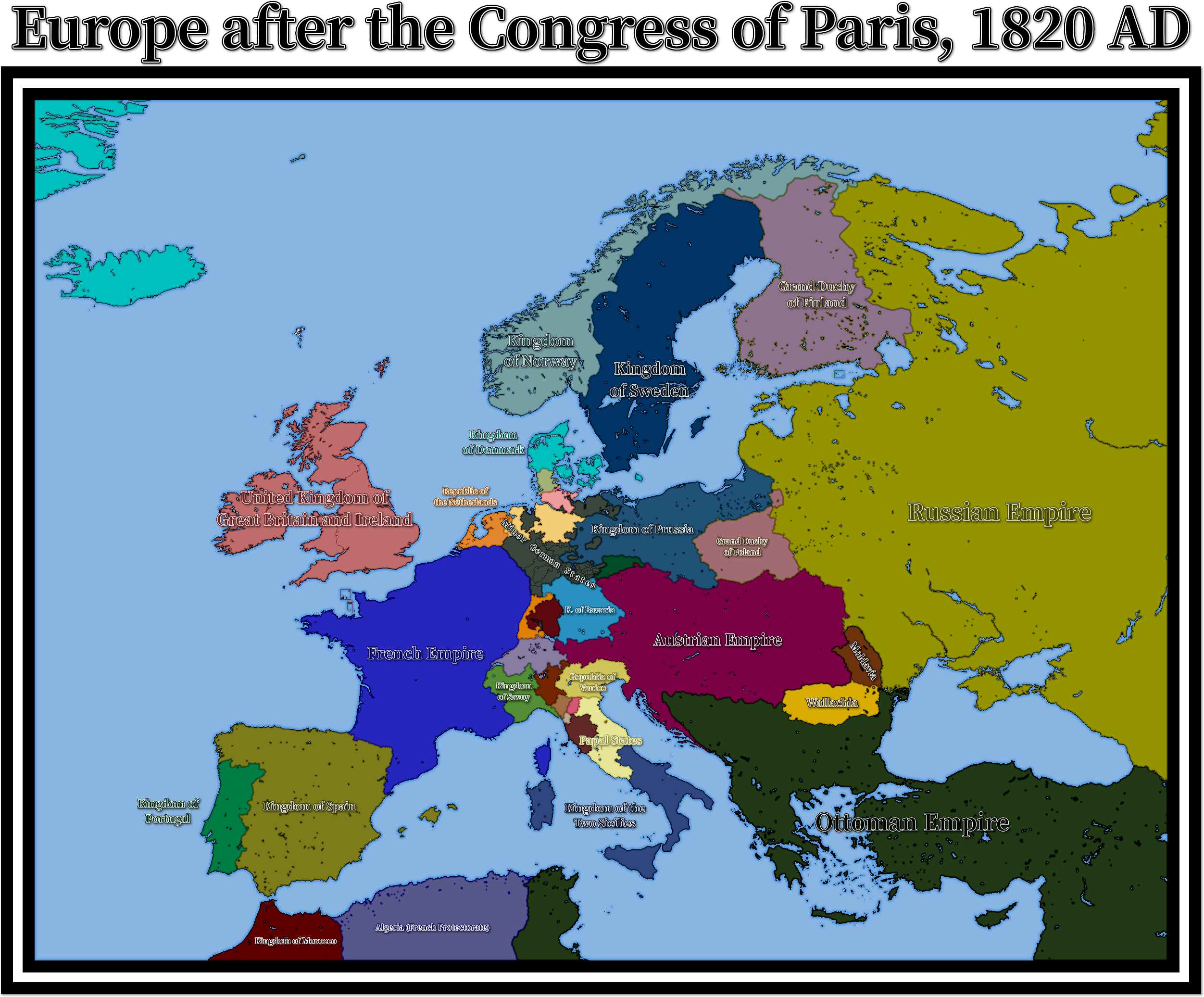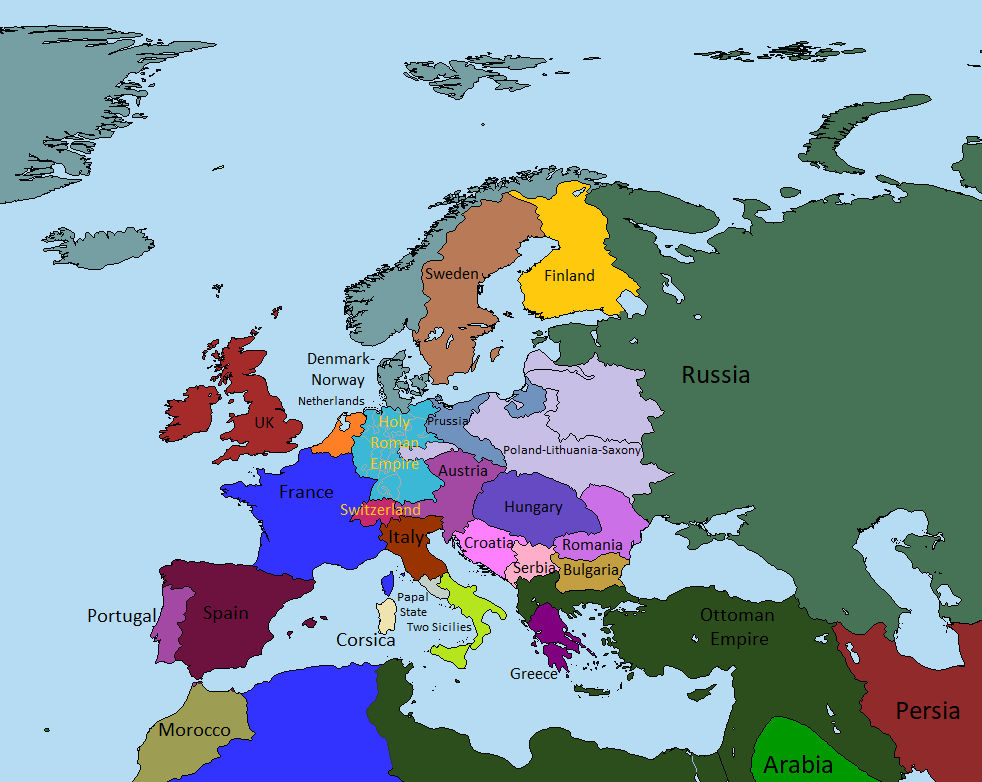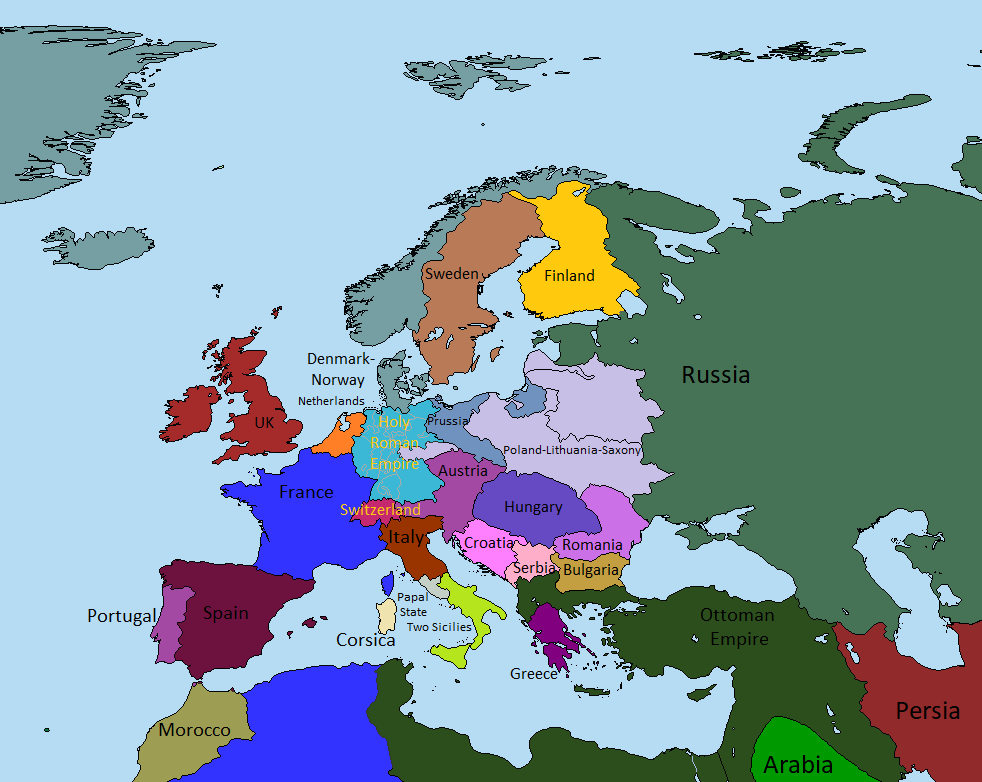- Home
- Forums
- Creative Content
- Alternate History
- Alternate History Discussion
- Alternate History Community Resources
You are using an out of date browser. It may not display this or other websites correctly.
You should upgrade or use an alternative browser.
You should upgrade or use an alternative browser.
Alternate History Map Thread
- Thread starter Basileus_Komnenos
- Start date

Napoleon's Return by Mobiyuz on DeviantArt


Napoleon Victory - 1900 by Maszio on DeviantArt

[TUDORICAS]: The Confederal Union of the Danubian Nations as of 1900 - r/imaginarymaps
View on Libreddit, an alternative private front-end to Reddit.
The 2015 Irish Independence Referendum
"By the barest of margins......"

In 1912, the 3rd Home Rule Act passed. After some trouble up north in Ulster by some Ulster Militias, the Emerald Isle had, after 111 years, finally recovered the autonomy that it had lost in 1801, which had devastating consequences on Ireland during the 1840s and 1850s. The first autonomous elections took place in Ireland in early 1914 to the jubilation of the Irish people. After seventy years, Irish confidence in Westminster had been finally restored. As Redmond said - "Ireland has become the emerald jewel of the British Kingdom." In WW1, over 275,000 Irishmen served against the Central Powers, volunteering for the British Army. Their loyalty was rewarded during the Interwar Era, which saw British investment in the isle grow tenfold. During the Second World War, Irishmen volunteered for the British Army once again, with around 350,000 serving in the British Armed Forces against the Axis Powers. It was the post-Second World War Economic Depression that broke the power of the Irish Parliamentary Party, which had dominated Irish politics continuously since 1912, allowing another regionalist, but with a more nationalistic tinge party, the Irish Cooperative Party to take power in 1952 in Ireland. Although Ireland was an autonomous and integrated member of the United Kingdom, though highly autonomous, Irish nationalism experienced a resurgence during the 1960s and 1970s over British fumbling of the economy and the loss of Britain's status as a Superpower. Nevertheless, a referendum held in 1982 on the question of having a second referendum on independence was defeated and the question was thought over. As the Social Democratic Party took power in the late 1980s, and the economic troubles of the UK ended, Irish nationalism started to seep back in. The 2008-09 Second Great Depression however proved to be the hammer that would bring back Irish Nationalism in Ireland as a major political force. The victory of the Emerald Party (A Nationalist Secessionist Party) in the 2012 Irish General Elections winning a plurality of the vote brought forward the first serious case of independence in over a century. The British government, reluctantly agreed to the Cork Agreement of 2014, agreeing that a referendum on independence would take place in Ireland in 2015, with the provision that should the 'yes' vote win, then Ireland would become independent as a Commonwealth Realm within 20 months at most. The Irish Unionist Party, Irish Parliamentary Party, Irish Labour, and Irish Liberals campaigned against independence whilst the Emerald Party, Irish Nationalist Party, and Sinn Fein campaigned in favor of independence. Once the ballots were counted, Ireland had voted, by the barest of margins, to remain within the United Kingdom."By the barest of margins......"

Thoughts and Comments?
The 2015 Irish Independence ReferendumIn 1912, the 3rd Home Rule Act passed. After some trouble up north in Ulster by some Ulster Militias, the Emerald Isle had, after 111 years, finally recovered the autonomy that it had lost in 1801, which had devastating consequences on Ireland during the 1840s and 1850s. The first autonomous elections took place in Ireland in early 1914 to the jubilation of the Irish people. After seventy years, Irish confidence in Westminster had been finally restored. As Redmond said - "Ireland has become the emerald jewel of the British Kingdom." In WW1, over 275,000 Irishmen served against the Central Powers, volunteering for the British Army. Their loyalty was rewarded during the Interwar Era, which saw British investment in the isle grow tenfold. During the Second World War, Irishmen volunteered for the British Army once again, with around 350,000 serving in the British Armed Forces against the Axis Powers. It was the post-Second World War Economic Depression that broke the power of the Irish Parliamentary Party, which had dominated Irish politics continuously since 1912, allowing another regionalist, but with a more nationalistic tinge party, the Irish Cooperative Party to take power in 1952 in Ireland. Although Ireland was an autonomous and integrated member of the United Kingdom, though highly autonomous, Irish nationalism experienced a resurgence during the 1960s and 1970s over British fumbling of the economy and the loss of Britain's status as a Superpower. Nevertheless, a referendum held in 1982 on the question of having a second referendum on independence was defeated and the question was thought over. As the Social Democratic Party took power in the late 1980s, and the economic troubles of the UK ended, Irish nationalism started to seep back in. The 2008-09 Second Great Depression however proved to be the hammer that would bring back Irish Nationalism in Ireland as a major political force. The victory of the Emerald Party (A Nationalist Secessionist Party) in the 2012 Irish General Elections winning a plurality of the vote brought forward the first serious case of independence in over a century. The British government, reluctantly agreed to the Cork Agreement of 2014, agreeing that a referendum on independence would take place in Ireland in 2015, with the provision that should the 'yes' vote win, then Ireland would become independent as a Commonwealth Realm within 20 months at most. The Irish Unionist Party, Irish Parliamentary Party, Irish Labour, and Irish Liberals campaigned against independence whilst the Emerald Party, Irish Nationalist Party, and Sinn Fein campaigned in favor of independence. Once the ballots were counted, Ireland had voted, by the barest of margins, to remain within the United Kingdom.
"By the barest of margins......"

Thoughts and Comments?
How did immigrants vote in this referendum?
I cannot remember where I read that the Prime Minister had connections to the Black hand, but if I remember correctly his secretary's father was a black hand member, and a high ranking one at that. Besides that the war should never had reached such high ranking devastation. If Russia kept it's nose out then all would be good. No big war. Infact, russia had no reason to side with Serbia, it's RF had no relations to the Serbs, the Serbs themselves brought the war upon themselves.
True Russia could possibly have deserted its only remaining ally in the Balkans when that was threatened with invasion or pretty much unconditional submission to Austrian control but that would have been politically very costly for them and [virtually] no one realised the duration and costs of the war that resulted. Plus it would have still left Europe with a lot of tension and Berlin convinced it was running out of time before it could win a military victory - and unwilling to consider any other option.
France wasn't the only one, I shall give you that, but it was the largest voice. Britain tried to appease Germany, as they saw what Versailles wrought.
True but how well did appeasement work? Even before Hitler came to power reparations was a dead duck. Chamberlain tried to meet all Hitler's demands but he simply kept making new ones and breaking existing agreements.
The U.S. actually would continue a pseudo-gold standard, otherwise known as the Bretton Woods system. It was a stabilizer and made the U.S. Currency worth something. However Charles de Gaulle would pull France's gold out, which would cause several other nations to also pull out their gold. To avoid a total collapse in the economy, the U.S. would cease convertibility of the U.S. dollar to gold, making the dollar fiat.
Ah I have seen suggestions trying to blame France for the duration of the Great Depression and thought you were referring to that. There was the pseudo gold standard after WWII but from what I've read before - albeit not for some time the key issue was the level of the US deficit that prompted it to abandon the Bretton Woods system.
Either way I don't think that was the cause of the US economic decline as that is far more due to internal decisions over a prolonged period of time.

The Majapahit Empire would find itself in a resurgance period from 1444 to 1594. Beginning under Queen Suhita Makapahit would win a slew of military victories, conquering land back under it's fold. The Largest war would take place in 1519, between Brunei and Majapahit, lasting four years and ending in total conquest of Brunei, it would mark the end of Sunni Islam in the Indonesian Islands, and ensure the rule of Hindu for all of time.
The Majapahit Empire would slowly collapse between 1620 and 1700, ending in conquest by the British Empire in 1700.
This is based around an actual EUIv game I played, perhaps I will find the save file and show ya'll it.
That would make for a radically different SE Asia although not sure that the empire would hold that entire area. Some places like New Guinea would probably simply be too distant and uneconomically to control. Mind you if they did hold such a large region you could possibly see some settlement of or at least exploration of Australia as they would almost certain know of such a large land mass to the south.
Know it was from a game but how did they deal with the Spanish and Dutch who OTL dominated large chunks of the region in this sort of period or did butterlfies mean they didn't emerge as significant powers in the region in the game?
VictortheMonarch
Victor the Crusader
Although it may be off topic, the Bretton woods system was supremely superior to the fiat currency we have at the moment. And yes france did indeed incite the abandonment of this system, the deficit was a factor, but a very minor one. When france pulled it's gold out, it sent out a panic in the nation. France pulled it's gold for a few reason's 1. America was fervently refusing to aid France in production of Nuclear weapons. 2. America's aid in helping Britain enter the E.E.C, 3. America wanted South Vietnam to have a fully independent democratic nation, not a puppet regime. 4. de Gaulle was Anti-American. He didn't like us and if he could have he would wholly abandon N.A.T.O, infact he did a semi-removal of French Troops of NATO, which is why NATO's headquarters is no longer in Paris.Either way I don't think that was the cause of the US economic decline as that is far more due to internal decisions over a prolonged period of time.
VictortheMonarch
Victor the Crusader
This is a map of them at their height in 1594. As I said this is based on a EUIV game I played, and I never attempted to go after Australia because my friend Jake was playing England and he called dibs. The cunt annexed me because I wouldn't give him Singapore.That would make for a radically different SE Asia although not sure that the empire would hold that entire area. Some places like New Guinea would probably simply be too distant and uneconomically to control. Mind you if they did hold such a large region you could possibly see some settlement of or at least exploration of Australia as they would almost certain know of such a large land mass to the south.
Know it was from a game but how did they deal with the Spanish and Dutch who OTL dominated large chunks of the region in this sort of period or did butterlfies mean they didn't emerge as significant powers in the region in the game?
The 2015 Irish Independence ReferendumIn 1912, the 3rd Home Rule Act passed. After some trouble up north in Ulster by some Ulster Militias, the Emerald Isle had, after 111 years, finally recovered the autonomy that it had lost in 1801, which had devastating consequences on Ireland during the 1840s and 1850s. The first autonomous elections took place in Ireland in early 1914 to the jubilation of the Irish people. After seventy years, Irish confidence in Westminster had been finally restored. As Redmond said - "Ireland has become the emerald jewel of the British Kingdom." In WW1, over 275,000 Irishmen served against the Central Powers, volunteering for the British Army. Their loyalty was rewarded during the Interwar Era, which saw British investment in the isle grow tenfold. During the Second World War, Irishmen volunteered for the British Army once again, with around 350,000 serving in the British Armed Forces against the Axis Powers. It was the post-Second World War Economic Depression that broke the power of the Irish Parliamentary Party, which had dominated Irish politics continuously since 1912, allowing another regionalist, but with a more nationalistic tinge party, the Irish Cooperative Party to take power in 1952 in Ireland. Although Ireland was an autonomous and integrated member of the United Kingdom, though highly autonomous, Irish nationalism experienced a resurgence during the 1960s and 1970s over British fumbling of the economy and the loss of Britain's status as a Superpower. Nevertheless, a referendum held in 1982 on the question of having a second referendum on independence was defeated and the question was thought over. As the Social Democratic Party took power in the late 1980s, and the economic troubles of the UK ended, Irish nationalism started to seep back in. The 2008-09 Second Great Depression however proved to be the hammer that would bring back Irish Nationalism in Ireland as a major political force. The victory of the Emerald Party (A Nationalist Secessionist Party) in the 2012 Irish General Elections winning a plurality of the vote brought forward the first serious case of independence in over a century. The British government, reluctantly agreed to the Cork Agreement of 2014, agreeing that a referendum on independence would take place in Ireland in 2015, with the provision that should the 'yes' vote win, then Ireland would become independent as a Commonwealth Realm within 20 months at most. The Irish Unionist Party, Irish Parliamentary Party, Irish Labour, and Irish Liberals campaigned against independence whilst the Emerald Party, Irish Nationalist Party, and Sinn Fein campaigned in favor of independence. Once the ballots were counted, Ireland had voted, by the barest of margins, to remain within the United Kingdom.
"By the barest of margins......"

Thoughts and Comments?
Interesting idea. A few points/queries.
a) How many people from Ireland volunteered for the army in WWI OTL as that figure seems rather low to me considering the massive commitment Britain [including both Catholic and Protestant unionists] made OTL?
b) What happened in 1916? Did the fanatics still try their coup or were they repressed more quickly by the local forces? As I can't see the hard liners accepting Home Rule any more than they did OTL but I suspect they would have gotten even less support than they did OTL.
c) I could see a reason for Irish nationalism to rise in a period of growing British economic difficulty but why would it increase further as things got better in Britain. [Or does the "Irish nationalism started to seep back in." actually mean it went into decline for a period. Good to see that in TTL we avoided the prolonged Thatcherite disaster.
d) How did Ireland develop socially TTL compared to OTL? Presumably hard liners like de Valera failed to gain power so it wasn't as socially retarted as OTL and since there would be the need to keep the Protestant Unionists on line the Catholic church wouldn't gain the same level of power. That should enable a more developed economy - coupled with the increased economic interaction with Britain - and avoid the sort of social repression that blighted the country for so long. Correspondingly it might also mean that the hard line Unions are also brought along socially.
Although it may be off topic, the Bretton woods system was supremely superior to the fiat currency we have at the moment. And yes france did indeed incite the abandonment of this system, the deficit was a factor, but a very minor one. When france pulled it's gold out, it sent out a panic in the nation. France pulled it's gold for a few reason's 1. America was fervently refusing to aid France in production of Nuclear weapons. 2. America's aid in helping Britain enter the E.E.C, 3. America wanted South Vietnam to have a fully independent democratic nation, not a puppet regime. 4. de Gaulle was Anti-American. He didn't like us and if he could have he would wholly abandon N.A.T.O, infact he did a semi-removal of French Troops of NATO, which is why NATO's headquarters is no longer in Paris.
I agree that de Gaulle was an asshole and he didn't like anyone. Ironically I wish he had stayed in power longer as joining the EEC was one of the two worst disasters for Britain in the 1970's.
VictortheMonarch
Victor the Crusader
Personally don't understand this map at all, from what I understand it is rather strange that the Irish would not revolt after all the pushing the British done to the Irish, from rendering their language partially extinct, destroying cultural sites to the point very few yet remain, and worst of all, Persecuting the Irish Insular faith, then turning Around and persecuting's the Irish Catholic faith. This as it stands is the most important part in the Easter Rising and the Irish Independence War. I simply can't see the Irish, who's history is 95% telling people to go suck a cock ever wanting to stay in a union with England, especially after world war one, when the time was then to rise up. No amount of politicking would stop the rebellion from ensuing. I personally like the Idea of Ireland being apart of the U.K., and I feel the Duke of Wellington to be the last chance for the Irish to heel to the British, as that was the best chance to prevent the famine and see an abundance of loyal Irish men and women. This is where your Duke of Wellington story is shining, as from where I last read it (I am banned on althist due to differing politics from the Mods) It seemed to be going in the right direction.The 2015 Irish Independence Referendum
"By the barest of margins......"

Mostly NoHow did immigrants vote in this referendum?
round ~190,000 - ~200,000 Irishmen were in the British Armed Forces in WW1 Otl. Most of them were Protestant Irishmen to boot, so having another ~80,000 mostly Catholic Irishmen volunteer would be a good sign for Westminster at the time.a) How many people from Ireland volunteered for the army in WWI OTL as that figure seems rather low to me considering the massive commitment Britain [including both Catholic and Protestant unionists] made OTL?
The more moderate Nationalists of the Easter Rising bail out due to most of their demands being met, and without them, the rising does not go ahead.b) What happened in 1916? Did the fanatics still try their coup or were they repressed more quickly by the local forces? As I can't see the hard liners accepting Home Rule any more than they did OTL but I suspect they would have gotten even less support than they did OTL.
yes seep back in meant declinedc) I could see a reason for Irish nationalism to rise in a period of growing British economic difficulty but why would it increase further as things got better in Britain. [Or does the "Irish nationalism started to seep back in." actually mean it went into decline for a period. Good to see that in TTL we avoided the prolonged Thatcherite disaster.
It's religious restrictions became looser much earlier than OTL, around ~1960 and ~1970 like the rest of the UK. The east coast of Ireland is very developed, on par with the rest of the UK - one of the reasons why it voted No was because of the dependence of the east coast economically to the rest of the UK.d) How did Ireland develop socially TTL compared to OTL? Presumably hard liners like de Valera failed to gain power so it wasn't as socially retarted as OTL and since there would be the need to keep the Protestant Unionists on line the Catholic church wouldn't gain the same level of power. That should enable a more developed economy - coupled with the increased economic interaction with Britain - and avoid the sort of social repression that blighted the country for so long. Correspondingly it might also mean that the hard line Unions are also brought along socially.
Irish Independence among the general populace was very much a fringe concept among Irishmen even in WW1. Irish regionalism was not and was very popular, but independence was a fringe ideology. The Easter Rising of 1916 was initially very unpopular with the Irish general population (they can go hang themselves! Redmond said allegedly) until the British overreacted after the incident.Personally don't understand this map at all, from what I understand it is rather strange that the Irish would not revolt after all the pushing the British done to the Irish, from rendering their language partially extinct, destroying cultural sites to the point very few yet remain, and worst of all, Persecuting the Irish Insular faith, then turning Around and persecuting's the Irish Catholic faith. This as it stands is the most important part in the Easter Rising and the Irish Independence War. I simply can't see the Irish, who's history is 95% telling people to go suck a cock ever wanting to stay in a union with England, especially after world war one, when the time was then to rise up. No amount of politicking would stop the rebellion from ensuing. I personally like the Idea of Ireland being apart of the U.K., and I feel the Duke of Wellington to be the last chance for the Irish to heel to the British, as that was the best chance to prevent the famine and see an abundance of loyal Irish men and women. This is where your Duke of Wellington story is shining, as from where I last read it (I am banned on althist due to differing politics from the Mods) It seemed to be going in the right direction.
VictortheMonarch
Victor the Crusader
For todays first map, America, but better


VictortheMonarch
Victor the Crusader
I would presume that American Xing would supply a lot of cute Asian waifus to the rest of the US, right?
True Russia could possibly have deserted its only remaining ally in the Balkans when that was threatened with invasion or pretty much unconditional submission to Austrian control but that would have been politically very costly for them and [virtually] no one realised the duration and costs of the war that resulted. Plus it would have still left Europe with a lot of tension and Berlin convinced it was running out of time before it could win a military victory - and unwilling to consider any other option.
Would having Russia throw Serbia under the bus really be any more costly for Russia than the Anglo-French decision to throw Czechoslovakia under the bus almost 2.5 years later or a hypothetical decision by a surviving JFK to throw South Vietnam under the bus half a century after the start of World War I?
Users who are viewing this thread
Total: 3 (members: 0, guests: 3)



